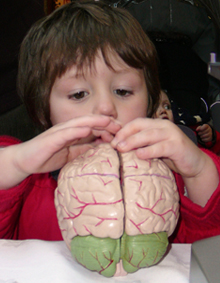Societal impact
Bristol Neuroscience Festival
Bristol Neuroscience has a strong commitment towards public engagement which we support by fundraising for events, providing dissemination training and guidance, sharing the impact of our research with a wide audience, and opening up neuroscience to members of the public.
The most important vehicle for these activities is the biennial Bristol Neuroscience Festival (BNF) which incorporates family events and hands-on science activities, talks, dialogue and debate, school workshops and art collaborations.
Go the BNF website for full details of the Festival and its impact and activities

Making a difference
Beyond the laboratory, beyond the University, and beyond Bristol, Bristol Neuroscience is making a difference in numerous ways to benefit science and wider society.
Medicine
Developing stem cell treatment for multiple sclerosis, research into dementia, therapies to prevent brain damage in babies, and pioneering neurosurgical techniques for movement disorders, depression and epilepsy are some of the translational research projects which have real impact in the clinic.
Lifestyle and public health
The neuroscience of aging, smoking, alcoholism, blood pressure, exercise and dementia, and the neurological and psychological factors influencing food intake - all studied in Bristol Neuroscience - have important implications for public health policy and individual lifestyle choice. Mental health issues, too, have a big impact in society; Bristol research on suicide led to changes that dramatically reduced death rates.
Industry
Findings from the lab and clinic can become reality through close collaborations with the pharmaceutical industry. Bristol Neuroscience's industrial partners include Eli Lilly, Pfizer and Tocris Bioscience - a company that has its origins in the university. Start-up companies, founded by people in Bristol Neuroscience, are another way that our research makes a difference, eg Apitope and its pioneering treatments for multiple sclerosis.
Making a difference in science
Bristol’s neuroscience research ranked in the top 10% for research power in the Psychology, Psychiatry and Neuroscience Unit of Assessment in the last Research Exercise Framework (REF2014).
Technology and computing
Partnerships with Computer Science, Engineering, and the Bristol Robotics Lab (BRL) has led to real-life technological applications of neuroscience research. One application of the Visual Information Laboratory is a computer aided system for the blind, whilst the intelligent systems laboratory explores and exploits principles underlying learning and intelligence.
Public policy
Members of Bristol Neuroscience are sought by policy makers such as Department of Health for their expertise and views, and many are involved in writing clinical guidelines for NICE. As Research Council committee members, Trustees of non-governmental organisations, part of advisory boards, or through providing reports, Bristol Neuroscience members have direct impact on important societal issues.